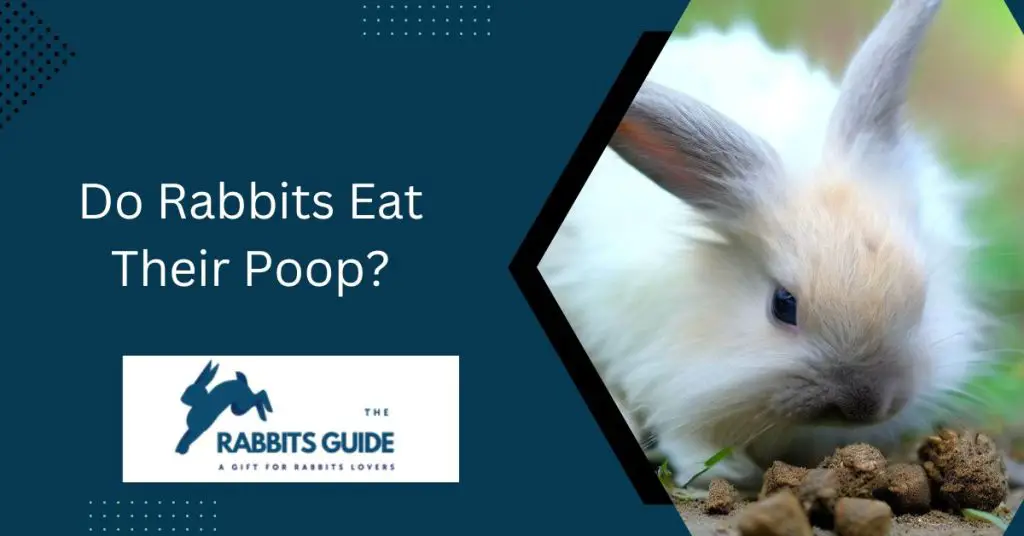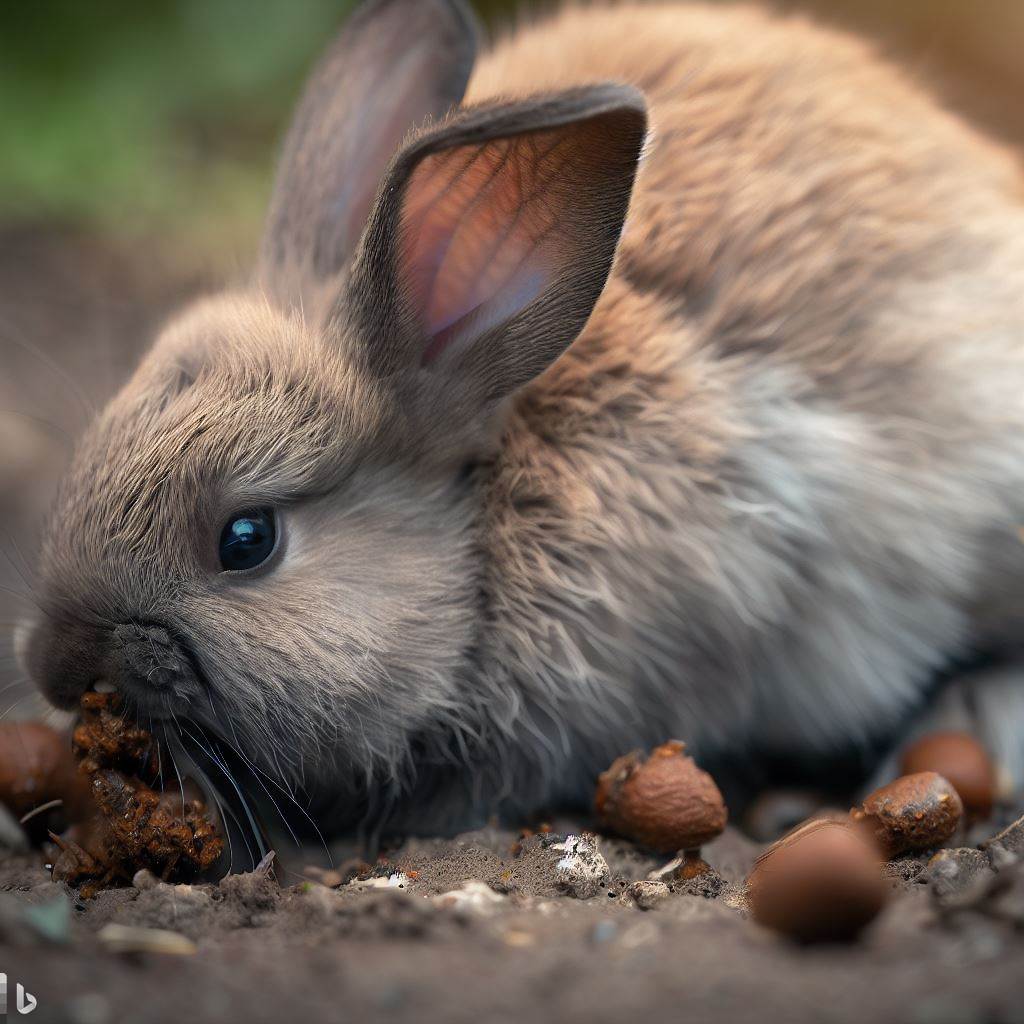Last updated on July 14th, 2023 at 05:12 pm
Do Rabbits Eat Their Poop? Discover the surprising truth about whether rabbits eat their poop in this informative guide.
Introduction
An interesting characteristic of rabbits is their tendency to consume their feces, also known as coprophagy, making them stand out from many other creatures. The reasons behind this unusual behaviour and its benefits to these furry creatures are often discussed among rabbit owners and enthusiasts. We will examine the reasons behind this unusual habit in this article.
Do Rabbits Eat Their Poop?
Yes, rabbits eat their poop. This may sound strange, but it is a normal and essential behaviour for them. The specific term for this behaviour is called “coprophagy.”
Designed to extract as many nutrients from their food as possible, rabbits have a unique digestive system. As rabbits eat, their digestive system produces cecotropes, a soft, partially digested form of waste. This waste is produced in a specialized part of their digestive system called the cecum.
Instead of being excreted like normal feces, the rabbit reingested the cecotropes. This allows them to extract additional nutrients from their food, such as vitamins, proteins, and fatty acids. Besides being rich in beneficial bacteria, cecotropes also facilitate digestion.
As rabbits consume their cecotropes directly from their anus, it might appear that they are eating their poop, but they are consuming a healthier type of waste.
It’s important to note that rabbits also produce normal feces, which are round, dry pellets. They do not eat these fecal pellets, usually found in their litter boxes or scattered around their living area.
Eating their cecotropes is a natural and necessary behaviour for rabbits to ensure they obtain all the necessary nutrients.

Nutritional Benefits of Cecotropes for Rabbits
A unique type of feces produced by rabbits is cecotropes, also called “night feces” or “soft feces.” In contrast to normal feces, which are expelled and not consumed again, rabbits reingest cecotropes through coprophagy. This process is vital to rabbits’ health and provides several nutritional benefits.
Here are some of the nutritional benefits of cecotropes for rabbits
Essential Nutrients
Cecotropes have many essential nutrients, including proteins, vitamins, and minerals. Vitamins B and K are particularly abundant, produced by the beneficial bacteria in the rabbit’s cecum during fermentation.
Protein Utilization
As a result of their unique digestive system, rabbits can obtain the maximum amount of nutrition from plant-based foods. Coprophagy allows rabbits to reabsorb proteins not fully digested during their initial passage through the digestive system. It ensures that dietary protein is efficiently utilized.
Vitamin Synthesis
Rabbits consume cecotropes, which contain beneficial bacteria responsible for synthesizing certain vitamins, such as vitamin K and some B vitamins, which are important for various bodily functions and overall health.
Fibre Digestion
Cecotropes contain fibre-rich materials that have passed through the rabbit’s digestive system once. Rabbits are herbivores and consume a high-fibre diet. By reingesting cecotropes, rabbits have another opportunity to break down these fibrous materials and extract additional nutrients.
Efficient Nutrient Recycling
Using coprophagy, rabbits can efficiently recycle nutrients within themselves by consuming cecotropes. By consuming cecotropes, rabbits ensure that essential nutrients aren’t wasted and are used efficiently.

Rabbit Eating Poop, Not Cecotropes
If your rabbit is eating poop but not cecotropes, it may be a cause for concern. Rabbits typically engage in coprophagy, which is consuming their feces. However, Cecotropes are soft, nutrient-rich pellets produced by the cecum they specifically eat.
A rabbit’s health depends on cecotropes, which contain essential nutrients such as vitamins, proteins, and beneficial bacteria for digestion. As part of their digestive process, rabbits typically consume these cecotropes directly from their anus, which may seem strange to us but is a normal practice.
It could indicate an underlying issue if your rabbit eats regular fecal pellets instead of cecotropes.
Here are a few possible reasons
Diet imbalance
Diets lacking sufficient fibre can disrupt rabbits’ digestive systems and lead to abnormal feces. Rabbits need a diet primarily of hay, supplemented by fresh vegetables.
Gastrointestinal disorder
Cecotrope production and consumption may be affected by an underlying gastrointestinal issue, such as an infection, parasite infestation, or an imbalance in gut flora.
Dental problems
There can be discomfort or pain caused by dental issues, such as overgrown or misaligned teeth, leading to abnormal fecal intake and changes in eating habits.
Stress or anxiety
Rabbits can exhibit abnormal behaviour due to stress, such as environmental changes, lack of social interaction, and other stressors. Rabbits are sensitive animals; stress can negatively affect their behaviour and digestive system.
It is recommended to consult a veterinarian if your rabbit consistently eats normal feces instead of cecotropes. They can evaluate your rabbit’s overall health, perform required tests, and provide appropriate treatment or dietary adjustments to address the issue.

Preventing Coprophagy Problems in Rabbits
While it seems strange or unsanitary to humans that rabbits consume feces, it serves an essential purpose for them. Autophagy is a natural behaviour in rabbits. Rabbits have a unique digestive system that relies on two distinct processes to extract nutrients from their food. Among these processes is consuming semi-digestible feces called cecotropes, rich in essential nutrients. Coprophagy can cause problems if it occurs excessively or in inappropriate situations.
Here are some simple steps to prevent coprophagy problems in rabbits.
An animal’s diet should consist primarily of rabbit pellets supplemented with fresh hay, leafy greens, and other vegetables. In addition, monitor their food intake and avoid overfeeding, as overfeeding can result in excessive cecotrope production. This ensures they receive all the necessary nutrients and reduces the risk of coprophagy.
Make sure your rabbits have a clean living environment. You can reduce stress and minimize the likelihood of coprophagy by regularly cleaning their enclosure and promptly removing any soiled bedding or feces. Polluted environments can encourage coprophagy, as rabbits may consume their droppings because of necessity or confusion. Provide ample exercise and mental stimulation opportunities to keep your rabbits mentally and physically active.
These simple steps can help prevent coprophagy problems in rabbits and promote their overall health. However, if you notice persistent coprophagy or other concerning behaviours, it is advisable to consult with a veterinarian who specializes in rabbit care for further guidance and support.

Coprophagy in Domesticated Rabbits
The consumption of feces is a natural and common behaviour of domesticated rabbits and many other animals. Although it may appear strange to humans, coprophagy is essential for rabbits’ digestion.
It is known that rabbits are hindgut fermenters, which means their digestive system is specialized in extracting nutrients from plants, such as grass and hay. To get the most nutrition from their food, rabbits engage in coprophagy because their digestive system cannot break down all the nutrients efficiently during the first pass.
Rabbits produce two types of feces: hard, round pellets and soft, mucus-covered pellets known as cecotropes. Rabbits produce cecotropes in their cecum, a part of their digestive system, and they are high in vitamins, minerals, and proteins.
In the initial digestion process, rabbits excrete hard pellets, which are usually not consumed. Then, they engage in a behaviour known as “caecotrophy,” which involves eating soft cecotropes directly from their anus. By doing so, they are able to re-intake the nutrients and complete the digestion process.

Coprophagy and Wild Rabbits
In the wild, rabbits are herbivorous animals that primarily consume plant material such as grass, leaves, and twigs. However, coprophagy, the consumption of feces, is a natural and common behaviour observed in rabbits, including wild rabbits.
As part of their digestive system, the rabbit’s cecum creates cecotropes, which are soft, nutrient-rich fecal pellets. Wild rabbits engage in cecotrophy, a type of coprophagy that differs from the hard, round droppings that rabbits usually leave behind.
The rabbit does not excrete cecotropes but rather reingests them. They contain beneficial bacteria and undigested fibre, which can be broken down further to extract additional nutrients by the digestive system. In addition to vitamins, minerals, and proteins not fully digested during the first pass through the digestive system, rabbits can obtain these nutrients by consuming cecotropes.

How often do rabbits eat their poop?
Copr is the practice of eating one’s feces, specifically soft cecotropes, which is common in rabbits. It is a normal and essential part of their process to consume cecotropes directly from their anus, which occurs daily or every few days, depending on the rabbit’s specific needs.
Why do rats eat their babies?
The behaviour of rabbits does not normally include eating their babies. However, mother rabbits may sometimes exhibit cannibalistic tendencies towards their offspring. This behaviour is usually the result of extreme stress, malnutrition, or other health problems. To minimize the risk of such behaviours, providing rabbits with the right environment, proper nutrition, and veterinary care is crucial.
Do baby bunnies eat their poop?
A baby bunny, also called a kit, typically does not eat its feces. They are nourished solely by their mother’s milk in the early stages of their development. As they grow and transition to solid food, they will consume the cecotropes their mother provides, which are vital nutrients and beneficial bacteria. However, they do not eat their droppings as adult rabbits do.
Rabbit-eating poop, not cecotropes (Reddit)?
It may be a sign of an issue if you observe a rabbit eating its own droppings that are not cecotropes. Rabbits normally eat cecotropes directly from their anus, and these soft pellets differ from hard, dry droppings. If a rabbit is consuming its regular droppings, it might be a sign of dietary imbalances, digestive problems, or nutritional deficiencies. A veterinarian should conduct an assessment of the rabbit’s diet and health.
Rabbit-eating poop pellets?
There is nothing unusual about rabbits eating their own poop pellets, especially hard, dry droppings. Regular droppings consumption helps rabbits extract nutrients not fully absorbed during their initial digestion, unlike cecotropes, which are reingested for nutritional purposes. There is nothing to be concerned about, as it is part of their digestive process.
Conclusion
As part of their overall health, rabbits engage in a unique behaviour known as coprophagy, which involves eating their feces. Although this might seem unsanitary at first, it serves a vital purpose. The rabbit’s specialized digestive system allows it to consume its soft, partly digested feces, known as cecotropes, to extract as many nutrients as possible from the food it consumes. These cecotropes contain essential vitamins, minerals, and beneficial bacteria for the rabbit’s well-being. Consequently, while we may find this behaviour strange, it is natural and necessary for rabbits to thrive. To get these vital nutrients, rabbits need to reingest their poop.
